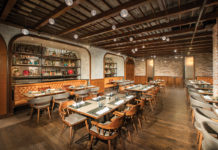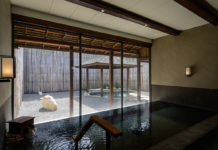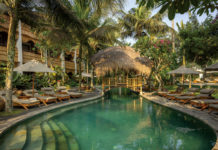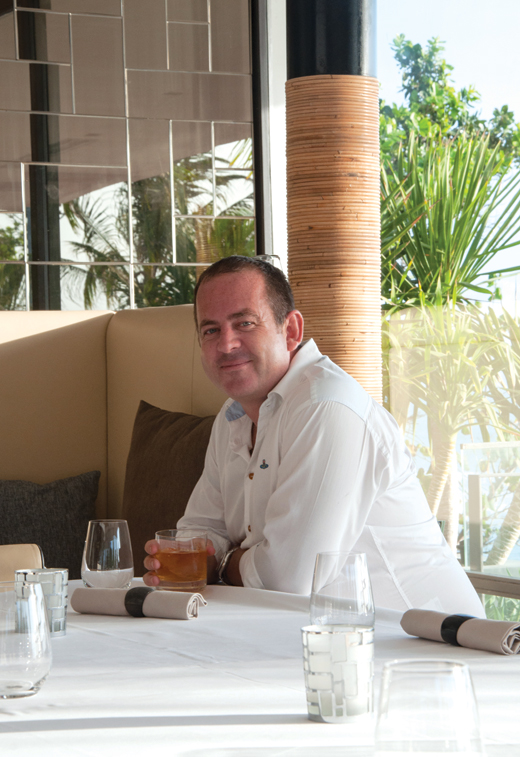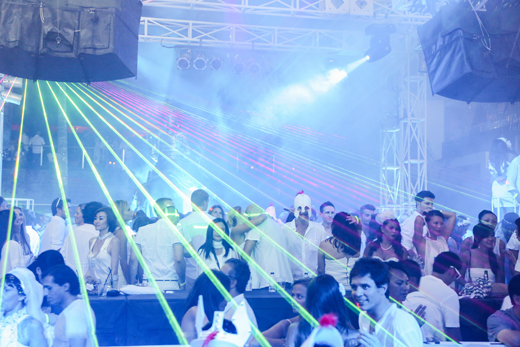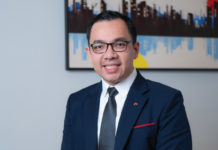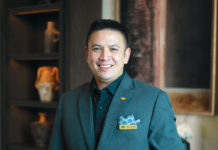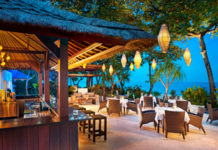KEEPING KU DE TA ON TOP
Steve Collinson is the General Manager of KU DE TA, one of Bali’s premier destinations for dining and nightlife for well over a decade. With the constant influx of hip new venues on the Island, what does it take to stay at the head of the pack? As Collinson discusses in this interview, it requires the determination to always be evolving and to never rest on your laurels.
Q: How did you first come to be the GM
at KU DE TA?
Steve Collinson: I’d been involved at KU DE TA in a variety of full time and consultancy roles since 2004, so I was fully versed in its strengths and comparative weaknesses by the time I was asked to take the GM role in 2010. Initially my opinion was that there were a few essential tweaks to make, so I was really excited to leave behind the more relaxed life of consultancy and take on the challenge of maintaining KU DE TA as the world class destination I know it to be.
Bali is a hugely competitive, constantly changing island. There are so many events and new venues emerging now, so where once we were a unique entity, there’s now a hot and healthy rivalry to keep forward-thinking venues on their toes.
Naturally, upon taking the GM role, I felt we needed to take a deep look at ourselves. The conclusion was, that as a pioneering location, we shouldn’t ever be perceived as content, or resting on our laurels. We even questioned whether we may have appeared a bit arrogant due to our ongoing success since opening in 2000, and whether we expected success to follow success without the need to push ourselves further.
Our answer to the question was a determination to bring the sense of adventure and inspiration back, in the right way – through delivering quality, rather than mere quantity. Ultimately it’s a quality that KU DE TA is judged upon, and having been involved in events here almost since they began, and witnessing the parallel growth of competition in Bali, I’m very aware of the difference.
Q: How did you make the transition from Mixologist to Manager?
Steve Collinson: Having grown up as a teen in clubs like the Hacienda in Manchester, Pushca in London, living through the UK Acid House and Rave fever of 25 years ago, then Ibiza, I naturally picked up so much experience and knowledge of the workings of parties and venues. The late 80s and early 90s were revolutionary, an incredibly innovative and inspiring musical period in the UK, with the structure for this future vast worldwide club-culture industry being effectively written and re-written by the day, as one fresh initiative followed the last.
By 1994, still enjoying a typically ‘misspent’ youth, I found myself running out of cash following an 18 month sojourn across India. I made my way to Hong Kong and it was there that I learnt to be a bartender, a useful role with which to work my way gradually back towards England. When I returned to London, after misspending more of my youth, it became my profession by default; it was also around that time the term ‘Mixologist’ was coined by the Met Bar in London. It was when I began working for Bank Group Restaurants that I really started to become interested in the management side of the business.
My work at leading hotels and big bars resulted in my becoming a consultant on bar design for people like Paul Allen from Microsoft and Dave Stewart of The Eurythmics.
There’s a real tendency for Mixologists to move towards bar consultancy, but in my opinion they need to do their flight time, because it’s travelling around the world as a bartender that really opened my eyes to a whole new level of hospitality, which led to me becoming a Manager. You need an awareness of fresh ideas and concepts if you have the ambition to be working with an international clientele.
In the two decades since, I’ve continued to work in large venues that involve multiple bars/restaurants and staff drawn from every walk of life. For me, managing such a scenario is basic common sense, no matter the size. However, when dealing with a commodity such as alcohol, simple things often become complex, so my role is equally about managing complexity, simply.
Q: What are your main responsibilities as GM?
Steve Collinson: As the GM for a business that’s open for a minimum of 18 hours a day, 363 days of the year (Nyepi and a staff outing day, in case you were wondering), I honestly don’t know where to start answering that question. For example, organising the August High Season events obviously involves seriously long and arduous discussions, but then so can talks about the technicality of a croissant with Chef Goldfarb. Then we entertain all manner of important characters throughout the year, plus we’re continually going over cash flow and budgeting, concept development, hiring of staff and so on – the whole nine yards.
The stuff I have to deal with on an hourly basis is unreal. It might be something, or someone, that a chef is currently unhappy with, a supply chain that’s broken down, buying new umbrellas and their colour/quality/material, a generator that’s blown up, toilet roll holders that we can’t get a hold of, the eye-watering fees that some DJs demand and that make my heart stop etc. But all that is just today, whereas tomorrow it might be something serious, or something ridiculous. No matter, because all are important to the smooth running of a gigantic and high quality venue like KU DE TA, and all need to be dealt with promptly, with every single detail going through my office.
Not quite being the superhuman being that I may appear to be, I tend to allow my people the freedom to do what they are paid to do. I certainly couldn’t cope without the behind-the-scenes departments, plus my amazing PA Fitri, who keeps me sane and prevents me from being inundated more than necessary.
The trick is anticipating the precise moment at which to step into an area, or even a multitude of areas of concern when you believe that support is required, or if you see an aspect of the establishment that needs improving or reinventing. The buck always stops with me, so I tend to put myself under pressure to ensure that I’m ahead of any impending mini-crisis. I don’t ever want to endure a conversation that includes the line “what you should have done…”
Q: What is the toughest part of your job?
Steve Collinson: In all honesty, I’ve never enjoyed firing people – it’s part of my nature, I guess. I accept that it’s part-and-parcel of the job, especially at a place with so many employees, but something that is only done when (we believe) it is fully deserved. I’ve had to deal with my fair share of dramas, but it’s definitely not something that I get enjoyment from. I believe in giving people a chance, and if that opportunity is taken up, it can lead to amazing things. If not, well, see you later.
Q: And what is the most rewarding?
Steve Collinson: The glorious feeling when we nail the High Season parties is very rewarding indeed, especially after all the stress and heartache involved in the tortuous planning of them.
But that’s a momentary buzz. What keeps me consistently content and upbeat is putting on great hospitality on a daily basis, all year round. Essentially we are a people business, so every single person that comes through the door should leave happy and having enjoyed their experience with us. This generally happens through the employing of quality staff and putting them through vigorous daily training, something which we incorporate into the smooth running of the venue.
Q: What is the most ridiculous complaint you’ve ever gotten from a customer? And how do you deal with customers who have unfair/unjustified complaints?
Steve Collinson: Over the years I’ve had people threaten to shoot me, take a swing at me; all kinds of nonsense. Not all complaints are as serious, and each has to be treated on its own merit, but stupid ones are the nature of hospitality nevertheless. How we go about dealing with them is a management judgement, though certainly every whisper of feedback from our supportive expat locals is considered very seriously, and then acted upon accordingly, where necessary. If we are at fault we sort it.
Q: How much work, on your end, goes into opening up a new venue like Mejekawi?
Steve Collinson: Mejekawi is KU DE TA grown up. It’s a very special entity that isn’t about the cash, but a place for foodies and for the evolving creative reputation of KU DE TA itself. It’s a dining experience about the best Island food, value engineered. Bali deserves such a venue.
This was the 19th opening that I’ve personally been involved with and openings are always tricky. Each country throws up its own unique challenges, so the trick is to get the right components in place: architect, contractor, chefs, bar and restaurant manager. For a start, you need to appreciate that KU DE TA was built 13 years ago without a second floor in mind. Fortunately Gary at Gfab and Bernie at OSS were able to solve this tiny matter with their design smarts!
The hardest part for us as a venue, was that everything was on show and the building work caused some necessary chaos. Our aim was to be as discrete as possible to customers and locals, who actually didn’t know we were building an icon on top of an icon.
Getting to the finish line was beyond complex. Everyone needs to be working in collaboration in order to achieve a seamless end result. My job is always to orchestrate the details that add up to a successful whole. I make a final call.
The thing about Mejekawi itself is that there’s no hiding place. Nothing is faked, and the whole experience is unpretentious, without smoke or mirrors. You literally see what we’re offering you at the most intimate level – just 30 diners and the finest local ingredients and talent around. Rather than do more covers for more tables, we wanted to do something interactive.
The dishes are prepared right under your nose, with the diner effectively sitting around the kitchen and able to witness every quiver of the service staff if something should go awry, or when the chef is under pressure. Hats off to Ben Cross and Goldfarb in what they’ve created.
Q: Who is another member of your team that you think deserves more recognition?
Steve Collinson: All of them! They’re genuinely amongst the most talented people on the planet.




